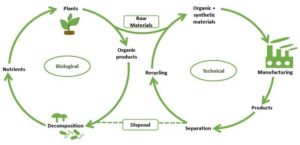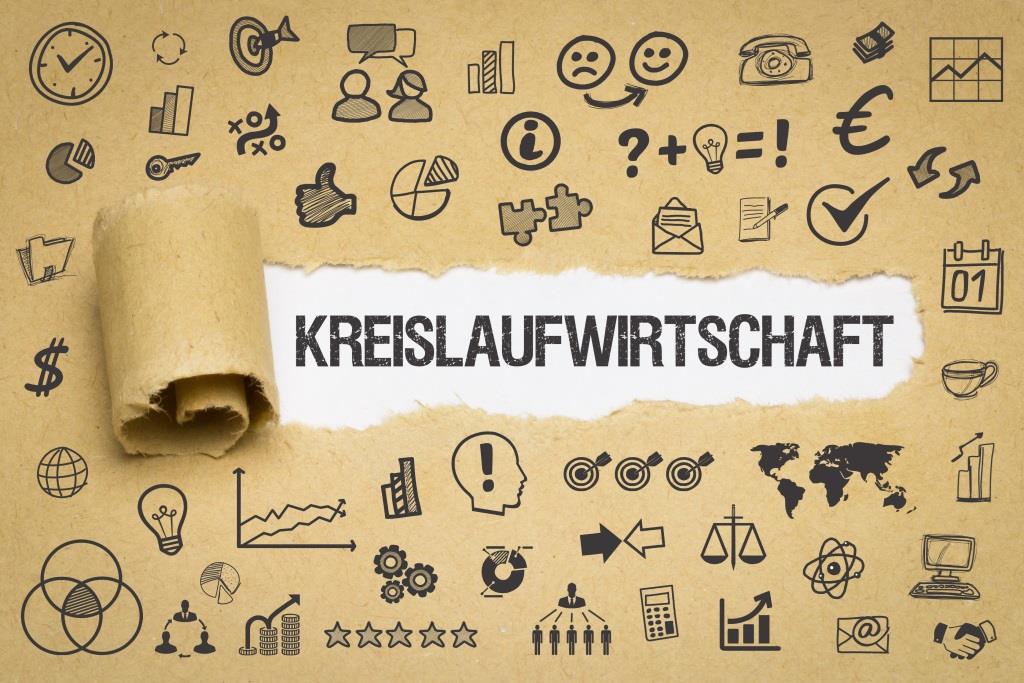Bildnachweis: magele-picture – stock.adobe.com, BIO Deutschland, Johannes Haas.
Climate change, among other challenges, is forcing a rethink of current usage of natural resources like land, water, air and fossil energy. We must do everything we can to sustain the environment, biodiversity, global health and social justice while keeping our economy strong. The sustainable bioeconomy is key to these aims because it includes agriculture and food, the replacement of fossil raw materials, the industrial production, the mobility sector and much more. By Prof. Dr Christine Lang and Dr Jörg Riesmeier
Concepts that target circular economy and cascade utilisation allow us to preserve the value of products, materials and resources in the economy for as long as possible and improve the environmental efficiency of processes. Bioeconomy encompasses the sustainable production of renewable biological resources and the conversion of these resources and waste streams into valueadded products, such as food, feed, bio-based products and bioenergy. By applying innovative biotechnology, it is possible to produce bio-based products in all sectors of the economy. A knowledge-based bioeconomy – especially one that supports the circular economy – can only be achieved with biotechnology.
Bioeconomy involves the technological usage of renewable biological resources – whether this means microorganisms, enzymes, cell cultures or whole organisms – in circular systems (see Fig. 1).
 It appears that during the Covid-19 crisis, an increasing number of people are gaining awareness of sustainability and climate protection topics. This trend is underpinned by the results of a survey conducted by the public opinion research organisation Civey, on the occasion of the Bioeconomy Science Year 2020/21. According to the survey, 27% of all Germans believe the pandemic provides an opportunity for restructuring the current setup towards a more sustainable and climate-friendly economy. This is a good basis to initiate changes.
It appears that during the Covid-19 crisis, an increasing number of people are gaining awareness of sustainability and climate protection topics. This trend is underpinned by the results of a survey conducted by the public opinion research organisation Civey, on the occasion of the Bioeconomy Science Year 2020/21. According to the survey, 27% of all Germans believe the pandemic provides an opportunity for restructuring the current setup towards a more sustainable and climate-friendly economy. This is a good basis to initiate changes.
Policy decisions and commitment
Clear directional policy decisions and a strong commitment to a knowledge-based bioeconomy are essential for the rapid and efficient implementation of the Sustainable Development Goals (SDGs) of the United Nations. Germany has bundled strategic activities for the transformation to a bio-based economy in a national bioeconomy strategy. It is aligned with the SDGs and is an important and promising step towards promoting bioeconomy and sustainability.
Yet, due to low oil prices in the last years and an unclear policy environment, it has been difficult for German companies’ research and development innovations to reach the market. The results of their efforts are also increasingly being used in other regions of the world where more favourable framework conditions and regulations exist. As a result, the sustainability target took a backseat and this economic growth, additional jobs and tax revenues are generated outside Germany instead. This may now change with the rising price of fossil fuels – but we should aim to build an independent, non-volatile bioeconomy in Europe.

Capital requirements are high
The capital market in Germany is difficult for small and medium-sized companies in industrial biotechnology, but it is these companies that often have high capital requirements for bringing their products to market. This is why these companies are particularly dependent on project-specific funding programmes and support, for example through start-up funds. Public funding is a highly important pillar in innovation financing for sustainable technologies and products and needs to be expanded urgently and quickly.
Financing of the growth phase of a company is also critical. In industrial biotechnology, this applies to the scale-up of production, building inventory and filling the value chain. Therefore, bioeconomy urgently needs support to accelerate the implementation of processes and concepts. Such support may consist of, among other things, promoting precompetitive pilot plants and prototype developments. The 2021 funding program for industrial bioeconomy launched by the Federal Ministry of Economic Affairs and Energy has acquired support for the use and construction of demonstration plants. While the programme is very important and focuses on the right measures, the total funding still does not cover demand.
Venture capital is also an important financing resource for industrial biotechnology (and for medical biotechnology, too). If investments are appropriately diversified across sectors and companies, the innovative power of the biotechnology industry may help to generate higher returns on capital for insurance companies, pension funds and private individuals. Therefore, it would be sensible to create legal opportunities for German or European capital collection agencies to invest in venture capital. In addition, tax incentives, especially for private investors, are needed for the venture capital asset class.

Basic research in Germany is excellent. This is why we see a technology push for the bio-based industry while the market pull is still missing. New product development is expensive (especially in the scale-up phase mentioned above) and often the market is saturated with cheaper, non-sustainable or low-sustainability products, making market entry difficult. Solutions to this problem include, for example, blending quotas and material specifications that facilitate and accelerate the market entry of bio-based products. The economic policy framework in Germany also needs to be re-designed accelerating the entry of new sustainable processes and technologies into bioeconomy. We recommend that the fair comparison with traditional products and processes must take into account all costs as well as the environmental footprint of a product. This way, the advantages of the application of innovative technologies can be made visible.
Biologisation of industrial value creation
Knowledge-based bioeconomy is key to major global challenges. Bioeconomy is clearly more than just another raw material sector. It is characterised by unique features: it is about the “biologisation” of industrial value creation. Advances in life sciences open up scope for action in production and they secure the sustainable supply of food, medical products and raw materials for humanity. Sustainable bioeconomies of the future will be knowledge-based. However, today, sustainability is essentially associated with the term biomass and not with technological and biotechnological solutions, but without using these technologies and principles, it will not be possible to achieve climate targets. We appeal to the German government to clearly commit to biotechnology and support it in a targeted manner in the pre-competitive stage. A clear non-partisan political commitment to the central importance of biotechnology in all its facets is needed for the implementation of bioeconomy strategies.
Transparent communication for social dialogue
It is without doubt that the introduction of new technologies is always accompanied by a social dialogue promoting public participation and societal consensus. Here, the advantages of an industrial bioeconomy over a fossil fuel-based economy can be clearly articulated and put into perspective. Communication needs to be as transparent as possible as a basic prerequisite for this social dialogue and should enable consumers to know that they have not been misled by what they are buying.
It is high time to remove the obvious barriers to the successful implementation of a knowledge-based bioeconomy and a circular economy. We call on the new government to fully appreciate the potential of a sustainable bioeconomy and to set the right political course correctly and with determination.
ABOUT THE AUTHORS
Prof. Dr Christine Lang and Dr Jörg Riesmeier head together the Industrial Bioeconomy Working Group at BIO Deutschland. Prof. Lang is currently CSO of BELANO Medical, which she also co-founded. She was co-chair of Bioeconomy Council of the German government from 2012 to 2019. Dr Jörg Riesmeier is director of NextStepBiotech and Chairman of the supervisory board of Glycotope GmbH. From 2010 to 2017, he was CEO of Direvo Industrial Biotechnology GmbH.


